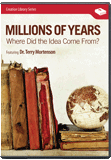
Review of The Magician’s Twin: C. S. Lewis on Science, Scientism, and Society
Abstract
C. S. Lewis scholar and senior Fellow of the Discovery Institute John G. West has compiled a series of articles, some of them written by himself, which challenge the claim that Lewis was a supporter of theistic evolution. This 347-page book challenges that claim as well as marshals additional evidence about the destructive nature of evolutionary theory.
Introduction
In 2012, the Discovery Institute, the center of the Intelligent Design movement, released the book The Magician’s Twin, edited by John G. West, a senior Fellow of the Institute and one of the editors of the highly regarded C. S. Lewis Readers’ Encyclopedia. The Magician’s Twin addresses, and challenges, the claim that the works of C. S. Lewis are a friend to Darwinian evolution. While not addressing the question of the age of the earth, this book contains many powerful chapters that point out the dangers and implications of the theory of evolution, and it refutes the idea that Lewis endorsed the full range of evolutionary theory. The three chapters by John West especially address the legacy of Lewis and are among the most helpful chapters.
What Lewis Believed
Since the name of Lewis appears in the subtitle of the book, let’s look first at what John West and others say about him. Chapter 6, “Darwin in the Dock,” contains the most important review of Lewis’s position on evolution. While not a young earth creationist, Lewis offered strong criticism of evolutionary theory.
Here are the fundamental positions taken by Lewis: (1) Lewis believed in the common descent of all human beings from one non-human ancestor, although he was skeptical of unguided natural selection (pp. 113f.). (2) Lewis believed in the fall into sin as an event in history, including a literal Adam and Eve stating “I believe that Man has fallen from the state of innocence in which he was created: I therefore disbelieve in any theory wh. contradicts this” (p. 117, citing an unpublished letter written to Bernard Acworth on September 23, 1944; see also pp. 121f.). (3) Lewis believed God worked the miracle that made Adam and Eve (but with openness to some sort of pre-Adamite: Lewis “Psychoanalysis and Literary Criticism,” in Selected Literary Essays, “We are at one with our pre-Adamite sires when we scratch,” 300) (West, pp. 117, 122). (4) Chance and necessity produce nothing, and natural selection has its limitations (pp. 122f., 125). (5) Reason, beauty, and morality cannot be explained by a blind material process (pp. 122, 128). For example, in “The Funeral of a Great Myth,” Lewis found it unbelievable that the theory of evolution “asks me to believe that reason is simply the unforeseen and unintended byproduct of a mindless process at one stage of its endless and aimless becoming” (pp. 54f.). (6) Evolutionists are growing in their dogmatism and intolerance. (7) The mass media have created a popular scientism. (8) The current paradigm discourages scientists from asking the questions that would elicit evidence for function and design.
Where many would part company with Lewis is in his letter to a critic of evolution, “I believe that Christianity can still be believed, even if Evolution is true.” While that is technically true, it grants more credence to evolution than it deserves. The evolutionary position runs counter to many of the straightforward statements of the Bible, including the testimony of Jesus. But Lewis also wrote, “I don’t mind whether God made man out of earth or whether ‘earth’ merely means ‘previous millennia of ancestral organisms.’ If the fossils make it probable that man’s physical ancestors ‘evolved,’ no matter” (p. 113). Lewis adopted a largely biblical position, but one with some significant compromises with Darwinism. And he apparently did not know much about the fossil record, which points to a sudden appearance of life rather than a gradual one.
Lewis pointed out in his book Miracles that the birth of modern science stemmed from the Judeo-Christian view of God as creator, which correlated with belief in the regularity of nature, while also warning that “biology after Darwin provided potent fuel for turning science into a secular religion” (p. 31). Lewis feared that many ideological and pseudo-scientific proposals would be set forth in the name of science, and his prediction has proved true. Among the radical proposals mentioned in The Magician’s Twin (but rejected by the writers of this book) are for an end to democracy (so claims British scientist James Lovelock), the reduction of earth’s population by up to 90% % (as urged by University of Texas evolutionary zoologist Eric Pianka), coercive government measures to control our diets (advocated by Harvard evolutionary biologist Daniel Lieberman), and the damaging of religious rights (which Kathleen Sibelius seems to support, p. 37).
“The Magician’s Twin”
The phrase “the magician’s twin” comes from Lewis himself. As John West points out, “the comparison between science and magic runs throughout a number of his works” (p. 19), the two ideas of science and magic being similar in that they are able to function as an alternative religion in their encouragement of a lack of skepticism, and in their quest for power.
The book is divided into four sections: Science & Scientism, Origins, Reason, and Society. Most prominently mentioned in this book are two of Lewis’ works, The Abolition of Man (Lewis’s defense of an objective standard of right and wrong with his predictions of where humankind is heading) and That Hideous Strength, the latter being the novelistic embodiment of the content of The Abolition of Man. In That Hideous Strength, for example, Lewis stated that the distortion of the physical sciences can have a negative result: “Despair of objective truth had been increasingly insinuated into the scientists; indifference to it, and a concentration upon mere power, had been the result” (p. 56f.).
In John Collins’ chapter in Part One, the sheer Darwinian perspective which sees us “as living systems” that are “nothing more than a bag of chemicals” is shown by Lewis to undercut anyone’s right to believe such a claim (p. 95). If we are “nothing more than a bag of chemicals,” Lewis suggests, how is it that a “bag of chemicals” is able to think such lofty, rational, and moral thoughts? Lewis develops this argument in his 1947 Miracles, so much so that the book can be described as not only a defense of the biblical account of miracles, but also a defense of the intelligent design of human beings. In addition, however, Lewis develops these ideas elsewhere. In his essay “Is Theology Poetry?” Lewis writes, “We love to notice that the express [train] engine of today is the descendant of the ‘Rocket’; we do not equally remember that the ‘Rocket’ springs not from some even more rudimentary engine, but from something much more perfect and complicated than itself—namely, a man of genius” (p. 156). In that same chapter, West refutes Michael Peterson’s claim that none of the arguments of Lewis are “really design-type arguments” (p. 157–173), in part, because he misrepresents the modern theory of intelligent design.
Predictions Realized
John West’s chapter in Part Two, Origins, plays off the title of one of Lewis’s essays, which is entitled “God in the Dock.” West’s article, “Darwin in the Dock,” puts Darwin on trial, using the quotation that many have seen on the Internet: “It will be a comfort to me all my life to know that the scientist and the materialist have not the last word: that Darwin and Spencer undermining ancestral beliefs stand themselves on a foundation of sand; of gigantic assumptions and irreconcilable contradictions an inch below the surface” (p. 109f.). He challenges Francis Collins, Kenton Sparks, and other theistic evolutionists, who, in turn, have challenged the authority of Scripture, the historicity of the Fall, or even the idea of divine direction in the evolutionary process (p. 110). However, as West also points out, Lewis also adopted some positions that have since been discredited, such as the idea that our evolutionary development is recapitulated in the womb (p. 114). Other references to the library of Lewis provide indications of his belief that an unfallen world (prior to Genesis 3) is incompatible with evolution (p. 116–120).
Furthermore, writes West, Lewis was “appalled by the growing dogmatism and intolerance he saw among evolutionists” (p. 138), something which we continue to see in our day. Lewis also argued correctly that the idea of developmentalism, an idea inherent in evolution, originated before the theory and then the theory followed (p. 142). Elsewhere Lewis defines developmentalism as “the extension of the evolutionary idea far beyond the biological realm: in fact, its adoption as the key principle of reality. To the modern man it seems simply natural that an ordered cosmos should emerge from chaos, that life should come out of the inanimate, reason out of instinct, civilization out of savagery, virtue out of animalism” (“Modern Man and His Categories of Thought,” Present Concerns, p. 63). Therefore, evolutionary theory did not originate with Darwin, but started much earlier, which allowed Darwin’s views easy acceptance.
There is much more to commend this book, particularly in Section Four of the book on Society. The description of Transhumanism, or the human enhancement movement, centered especially in Oxford, England, shows Lewis’s predictions in The Abolition of Man to be frighteningly accurate, as technology advances rapidly while our moral knowledge declines (see especially Chapter 10, “C. S. Lewis and the Advent of the Posthuman,” by James A Herrick).
One of the things not described in this book is the university setting in which Lewis taught. At Oxford University, Lewis would only have come in contact with people who were committed to a Darwinian view of science. Many believe that, had Lewis had more contact with young earth creationists, as he did with Bernard Acworth1 in the 1950s, he might well have adopted that position, or at least distanced himself further from the old earth position.
Conclusion
With the exception of Lewis’ adoption of biological evolution and the descent of man from a shared ancestor with animals (and the realization that the The Magician’s Twin does not address the age of the earth), I heartily recommend the book. Reading this book will correct the record and successfully dispel the myth that C. S. Lewis is a friend to Darwinian evolution even though Lewis was not a young earth creationist. Lewis’ challenge to many of the philosophical underpinnings of Darwinian evolution should give anyone pause for citing him as a friend of theistic evolutionary.
Footnotes
- According to Collected Letters, Vol. II, Lewis first wrote to Acworth in September 1951 and last in March 1960. However, The Magician’s Twin cites a 1944 letter to Acworth, which is not published in any of the three volumes of Collected Letters. Capt. Bernard Acworth (1885–1963), who was the Founder and President Emeritus of the Evolution Protest Movement, since 1980 known as the Creation Science Movement, served for eighteen years in submarines and commanded the Anti-Submarine Flotilla. The Evolution Protest Movement was founded in 1932 under the leadership of Douglas Dewar, John Ambrose Fleming, and Bernard Acworth. The movement is overwhelmingly young earth, and its chairman is David Rosevear, a young earth creationist.
Recommended Resources

Answers in Genesis is an apologetics ministry, dedicated to helping Christians defend their faith and proclaim the good news of Jesus Christ.
- Customer Service 800.778.3390
- © 2025 Answers in Genesis




